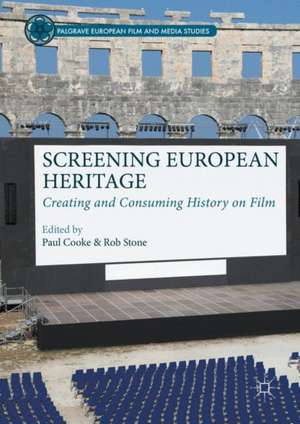Screening European Heritage: Creating and Consuming History on Film: Palgrave European Film and Media Studies
Editat de Paul Cooke, Rob Stoneen Limba Engleză Paperback – 14 noi 2018
Din seria Palgrave European Film and Media Studies
-
 Preț: 393.35 lei
Preț: 393.35 lei -
 Preț: 387.38 lei
Preț: 387.38 lei - 15%
 Preț: 642.51 lei
Preț: 642.51 lei - 18%
 Preț: 735.53 lei
Preț: 735.53 lei - 15%
 Preț: 645.14 lei
Preț: 645.14 lei - 15%
 Preț: 703.38 lei
Preț: 703.38 lei - 15%
 Preț: 534.36 lei
Preț: 534.36 lei - 18%
 Preț: 898.26 lei
Preț: 898.26 lei -
 Preț: 272.10 lei
Preț: 272.10 lei -
 Preț: 200.91 lei
Preț: 200.91 lei - 15%
 Preț: 591.79 lei
Preț: 591.79 lei -
 Preț: 201.45 lei
Preț: 201.45 lei - 15%
 Preț: 523.54 lei
Preț: 523.54 lei - 15%
 Preț: 468.25 lei
Preț: 468.25 lei - 9%
 Preț: 689.92 lei
Preț: 689.92 lei -
 Preț: 484.47 lei
Preț: 484.47 lei - 18%
 Preț: 728.91 lei
Preț: 728.91 lei - 18%
 Preț: 729.53 lei
Preț: 729.53 lei
Preț: 175.28 lei
Nou
Puncte Express: 263
Preț estimativ în valută:
33.54€ • 35.21$ • 27.84£
33.54€ • 35.21$ • 27.84£
Carte tipărită la comandă
Livrare economică 07-12 aprilie
Preluare comenzi: 021 569.72.76
Specificații
ISBN-13: 9781349706228
ISBN-10: 1349706221
Pagini: 290
Ilustrații: XXXIV, 290 p.
Dimensiuni: 148 x 210 mm
Greutate: 0.36 kg
Ediția:1st ed. 2016
Editura: Palgrave Macmillan UK
Colecția Palgrave Macmillan
Seria Palgrave European Film and Media Studies
Locul publicării:London, United Kingdom
ISBN-10: 1349706221
Pagini: 290
Ilustrații: XXXIV, 290 p.
Dimensiuni: 148 x 210 mm
Greutate: 0.36 kg
Ediția:1st ed. 2016
Editura: Palgrave Macmillan UK
Colecția Palgrave Macmillan
Seria Palgrave European Film and Media Studies
Locul publicării:London, United Kingdom
Cuprins
Contents.- List of illustrations.- Introduction: Screening European Heritage by Axel Bangert, Paul Cooke & Rob Stone.- Section One: Contexts of Production.- 1.The Politics and Sociology of Screening the Past: A National and Transnational Perspective … Ib Bondebjerg.- 2.British Flanders: Co-Produced Television Drama and the Limits of a European Heritage … Jaap Verheul.- 3. Towards World Heritage Cinema (Starting from the Negative) … Alan O’Leary.- Section Two: Limits of Representation.- 4. Rewriting History from the Margins: Diasporic Memory, Shabby Chic and Archival Footage … Daniela Bergahn.- 5. Facing Dark Heritage: The Legacy of Nazi Perpetrators in German-language Film … Axel Bangert.- 6. Spectral Spanish Heritage: The Hauntology of La noche de los girasoles … Paul Mitchell.- 7. Adapting Balzac in Jacques Rivette’s Ne Touchez pas la hache (Don’t Touch the Axe, 2007): Violence and the Post-Heritage Aesthetic … Andrew Watts.- 8. The Ironic Gaze: Roots Tourism and Irish Heritage Cinema … Ruth Barton.- 9. Whose Heritage?: Noi credevamo and the National, Regional and Transnational Dynamics of the Risorgimento Film … Alex Marlow-Mann.- Section Three: Modes of Consumption.- 10. Historical Films in Europe: The Transnational Production, Circulation and Reception of ‘National’ Heritage Drama … Andrew Higson.- 11. From ‘English’ Heritage to Transnational Audiences: Fan Perspectives and Practices and Why They Matter … Claire Monk.- 12. From ‘Auschwitz-land’ to Banglatown: Heritage Conflicts, Film and the Politics of Place … Paul Cooke.- 13. Cinematic Pilgrimages: Postmodern Heritage Cinema … Rob Stone.- Index
Notă biografică
Professor Paul Cooke is Centenary Chair of World Cinemas at the University of Leeds, UK. He has written on world cinema’s engagement with Hollywood and on the legacy of both National Socialism and the GDR in contemporary German culture. He is currently developing a series of community filmmaking projects exploring the ‘dark heritage’ of Germany and South Africa.
Professor Rob Stone is Chair of European Cinema and Professor of Film Studies at the University of Birmingham, UK. He is the author of several volumes on Spanish cinema, the political and cultural history of Basque cinema, flamenco and film, Surrealism and the cinema of Richard Linklater.
Textul de pe ultima copertă
This book provides a unique examination of the way Europe’s past is represented on contemporary screens and what this says about contemporary cultural attitudes to history. How do historical dramas come to TV and cinema screens across Europe? How is this shaped by the policies and practices of cultural institutions, from media funding boards to tourist agencies and heritage sites? Who watches these productions and how are they consumed in cinemas, on TV and online?, are just some of the questions this volume seeks to answer. From The Lives of Others to Game of Thrones, historical dramas are a particularly visible part of mainstream European film production, often generating major national debates on the role of the past in contemporary national identity construction.
